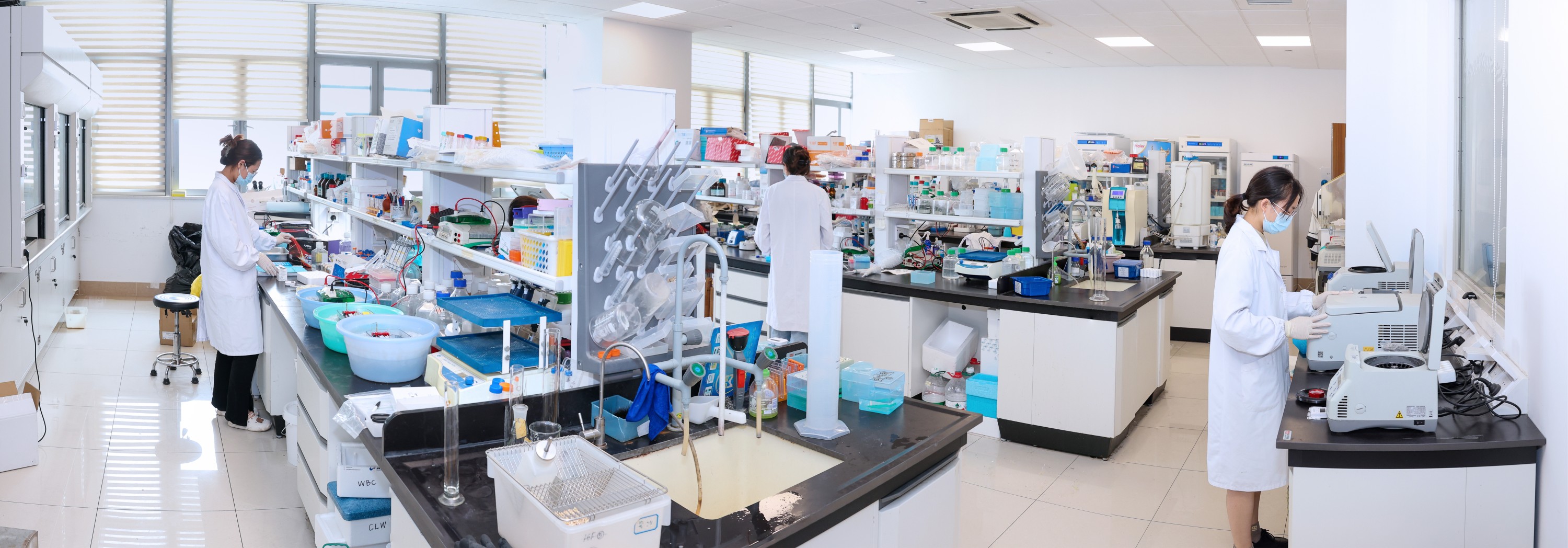Search


Shanghai Key Laboratory of Diabetes, affiliated with the Shanghai Sixth People's Hospital, was approved by the Science and Technology Commission of Shanghai Municipality in 2008 (No. 08DZ2230200). With an area of approximately 5,000 square meters, it encompasses original basic research, clinical diagnosis and treatment, and translational medical research on endocrine and metabolic diseases such as diabetes, obesity, and related conditions, including metabolic bone diseases.
The laboratory has established a sophisticated and robust research platform focused on unraveling the molecular genetics and etiology of metabolic diseases. This platform encompasses various experimental domains, including molecular genetics, cell biology, experimental animal models, human pathophysiological function assessment, and a community-based prevention and treatment center for metabolic diseases.
Equipped with cutting-edge instruments and equipment valued at nearly 200 million yuan, the laboratory boasts state-of-the-art technologies such as the Illumina high-throughput chip detection system, MiSeq second-generation sequencer, Sequenom mass spectrometry biochip system, Leica cryostat, flow cytometer, laser confocal microscope, and two-photon microscope. Additionally, it features a patch clamp workstation, Columbus CLAMS small animal metabolism detection system, Bruker body fat analyzer, FLIR infrared thermal imager, PerkinElmer IVIS intravital imager, and hyperinsulinemic-euglycemic clamp, among others.
These internationally advanced life science research instruments enable the laboratory to conduct both qualitative and quantitative analyses of protein macromolecules and small molecule metabolites across various biological samples. This comprehensive approach facilitates the exploration of functional genomics, the integration of proteomic and metabolomic data, and the systematic investigation of protein expression regulation mechanisms and interactions with transcriptional regulation modes implicated in the pathogenesis of metabolic diseases.

Over more than 30 years of dedicated effort, the laboratory has curated a vast population cohort dedicated to studying diabetes, obesity, and related metabolic disorders. This cohort includes both diabetic inpatients and normal controls, as well as a 10-year follow-up population drawn from the Shanghai community. Moreover, the laboratory has spearheaded initiatives such as the IDF global diabetic retinopathy screening cohort in low- and middle-income countries, and the exploration and assessment of a hierarchical diagnosis and treatment model for diabetes at the grassroots level in China through the roadmap study. Additionally, the laboratory has established several significant cohorts, including the China Diabetes Complications Research Cohort and the Shanghai Metabolic Disease (Diabetes) Prevention and Diagnosis and Treatment Service System Construction Cohort.
Furthermore, it has played a pivotal role in constructing a national-level metabolic disease clinical data and biological sample library. Funded by the Ministry of Science and Technology’s Major New Drug Creation Special Project-Clinical Biobank Construction Project, the laboratory has taken charge of building the national-level Metabolic Disease Clinical Biobank. As a national "985" Engineering science and technology innovation platform and a member of Metabolic Diseases Biobank Standardization Working Group of the National Technical Committee for Standardization of Biobank, the laboratory has amassed a comprehensive clinical information database along with corresponding serum, urine, feces, DNA, and tissue samples. With a total sample volume exceeding 300,000 and more than 1.5 million samples in total, this resource encompasses various samples, notably including the largest and longest follow-up period for weight loss/metabolic surgery in China, and the largest single-gene genetic bone disease sample bank in China. This rich repository of clinical data and samples serves as a unified resource platform for conducting clinical translational research on endocrine and metabolic diseases and for driving the development of innovative drugs. Over the past five years, the laboratory has led one international multi-center clinical trial and 20 domestic multi-center clinical trials, showcasing its commitment to advancing medical knowledge and improving patient care in the field of metabolic diseases.
The laboratory boasts an esteemed roster of accomplished professionals, including 2 academicians of the Chinese Academy of Engineering, 1 member of the Chinese Academy of Medical Sciences, and a winner of the National Science Fund for Distinguished Young Scholars. Additionally, it is home to 4 NSFC Excellent Young Scientists Fund recipient, 1 National Hundreds of Thousand Talents Program of Ministry of Human Resources and Social Security. Furthermore, the laboratory proudly hosts 1 Chang Jiang Scholar and 1 Youth Top-notch Talent by the Organization Department of the CPC Central Committee. Notable members also include 1 Young and Middle-aged Expert with Outstanding Contributions of National Health Commission, along with two members of National Basic Research Program of China (973 Program).
Moreover, the laboratory boasts a strong presence within the professional community, with 3 chairmen and 1 deputy chairman of the Chinese Medical Association's professional branch. Over the past five years, the research team has embarked on more than 70 projects, encompassing a wide range of initiatives. Their contributions to scientific literature are equally impressive, with nearly 400 SCI papers and research results published in esteemed international journals such as Cell, Nat Biotechnol, Sci TranslMed, Adv Drug Deliv Rev, Cell Metab, Nat Commun, and Am J Hum Genetics, among others. Additionally, their work has been featured in authoritative international endocrinology and metabolic diseases journals including BMJ, Lancet Diabetes Endo, Diabetes Care, Diabetes, Obesity, Int J Obesity, J Am Coll Cardiol, and J Clin Endocrinol Metab. Their dedication and excellence have not gone unnoticed, as evidenced by their receipt of 5 National Science and Technology Progress Awards, as well as 8 first-class and 9 second-class provincial and ministerial-level Science and Technology Progress Awards.

Research Platforms
- Shanghai Institute of Microsurgery on Extremities / Institute of Orthopaedic Surgery
- Shanghai Diabetes Institute/ Shanghai Key Laboratory of Diabetes
- Shanghai Key Laboratory of Sleep Disordered Breathing
- Shanghai Engineering Research Center for Orthopaedic Material Innovation and Tissue Regeneration
- Shanghai Key Laboratory of Neuro-Ultrasound for Diagnosis and Treatment
- Shanghai Neurological Rare Diseases Biobank and Precision Diagnosis Professional Technical Service Platform
- Shanghai Institute of Ultrasound in Medicine
- Imaging Medicine Institute of Shanghai Jiao Tong University




